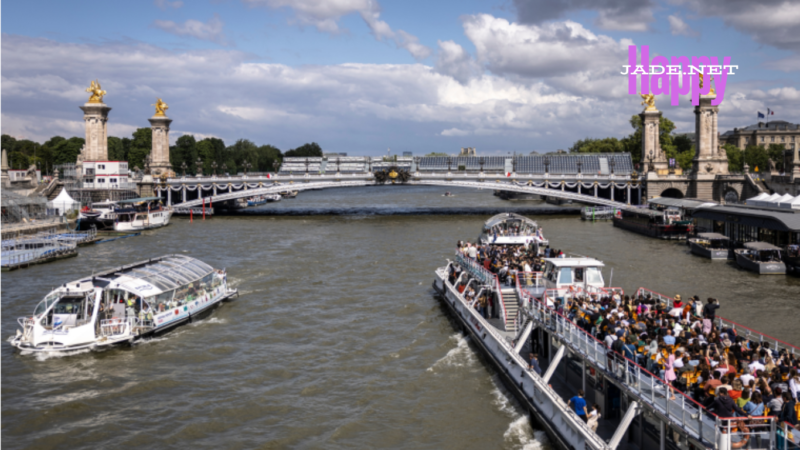Paris Olympics Poop Protest: Know What Is The Paris Poop Protest?
As Paris prepares to host the 2024 Summer Olympics, an unusual and controversial protest has emerged. French citizens have announced plans to defecate in the River Seine on June 23, 2024, in response to the French government’s efforts to clean the river for the upcoming Olympic events. This protest, dubbed “Je Chie Dans La Seine Le 23 Juin” (“I Poop in the Seine on June 23”), highlights widespread dissatisfaction with what many locals see as wasteful spending on the river’s cleanup. This article delves into the details of the Paris Olympics Poop Protest, its background, motivations, and implications.
Background and Motivation
The State of the River Seine
The River Seine, which runs through the heart of Paris, has been notoriously polluted for decades. Swimming in the river has been banned since 1923 due to safety concerns, primarily related to water contamination. The river has long been a repository for industrial waste, sewage, and urban runoff, leading to high levels of pollutants and harmful bacteria.
Olympic Preparations and Cleanup Efforts
With the Paris 2024 Olympics approaching, the French government has allocated approximately €1.4 billion to clean the river to host open-water swimming and triathlon events. This ambitious project aims to transform the Seine into a swimmable waterway by significantly reducing pollution levels and improving water quality. The cleanup includes installing new sewage treatment facilities, modernizing existing infrastructure, and implementing stricter regulations on waste disposal.
Public Skepticism and Criticism
Despite these efforts, many Parisians are skeptical about the feasibility and necessity of this massive cleanup operation. Recent water quality tests have shown that the Seine still contains high levels of E.coli, raising concerns about the safety of the athletes who will compete in these waters. Critics argue that the funds could be better spent addressing more pressing social and infrastructural issues within the city, such as affordable housing, healthcare, and education.
Details of the Protest
Origin of the Protest
The protest is set to coincide with a planned swim by French President Emmanuel Macron and Paris Mayor Anne Hidalgo, who intend to demonstrate the river’s safety. Macron’s public commitment to swim in the Seine has been met with a mix of skepticism and outrage, fueling the protest movement. The hashtag #JeChieDansLaSeineLe23Juin has gained traction on social media, with thousands of posts and memes supporting the cause.
Organizational Efforts
The protest organizers have created a website and social media pages to coordinate the event, providing details on the logistics of the protest and encouraging participants to gather along the Seine on June 23. The goal is to disrupt the symbolic swim by President Macron and Mayor Hidalgo and draw attention to the perceived misallocation of resources.
Expected Participation
Estimates suggest that hundreds, if not thousands, of people may participate in the protest. Organizers have called for participants to bring signs, banners, and other forms of protest paraphernalia to amplify their message. The event is expected to attract significant media coverage, both locally and internationally.
Public and Official Reactions
Supporters’ Perspective
Supporters argue that the demonstration is a necessary act of civil disobedience to highlight government waste and mismanagement. They see the planned swim by government officials as a publicity stunt that does not address the underlying issues of pollution and public health. Many believe that the cleanup efforts are more about creating a facade of environmental responsibility rather than achieving long-term sustainable improvements.
Critics’ Perspective
Conversely, critics of the protest view it as an irresponsible and unsanitary act that could further damage the city’s reputation ahead of the global event. There are concerns about the potential health risks associated with such a demonstration, not only for the protesters but also for the general public and the environment. Some argue that the protest could undermine genuine efforts to improve water quality and public health in Paris.
Official Responses
City officials and Olympic organizers have expressed their disappointment and urged citizens to reconsider participating in the protest. They emphasize the long-term benefits of the cleanup efforts, which aim to make the Seine swimmable for both residents and tourists long after the Olympics have concluded. President Macron and Mayor Hidalgo have reiterated their commitment to improving the river’s condition and ensuring the safety of all athletes and visitors during the Olympics.
Implications for the Paris 2024 Olympics
Potential Disruptions
The protest adds to the growing list of challenges faced by the Paris 2024 Olympic organizers. Ensuring the safety and success of the games amidst public dissent and logistical hurdles is a significant concern. The potential disruption caused by the protest could have far-reaching implications for the image and execution of the Olympic events. Security measures may need to be increased, and contingency plans developed to address any unexpected developments.
Broader Issues Highlighted by the Protest
The Paris Olympics Poop Protest underscores broader issues of environmental policy, public health, and governance in Paris. It raises important questions about the priorities of urban development and the allocation of public funds, particularly in the context of hosting a major international event. The protest reflects a growing discontent with government policies and a demand for greater transparency and accountability.
The Role of Social Media
Amplification of the Protest
Social media has played a crucial role in organizing and amplifying the Paris Olympics Poop Protest. Platforms like Twitter, Facebook, and Instagram have been used to spread the message, mobilize supporters, and coordinate logistics. The hashtag #JeChieDansLaSeineLe23Juin has trended, drawing attention to the cause and generating widespread discussion.
Memes and Satire
Memes and satirical content have been widely shared, adding a layer of humor to the protest while also emphasizing the seriousness of the underlying issues. This approach has helped engage a broader audience and maintain the momentum of the protest movement.
Environmental and Health Concerns
Pollution and Public Health
The protest highlights ongoing concerns about pollution in the River Seine and its impact on public health. Despite cleanup efforts, the presence of harmful bacteria like E.coli remains a significant issue. Critics argue that more comprehensive and sustainable measures are needed to address the root causes of pollution.
Long-Term Environmental Goals
While the immediate focus is on the Paris Olympics, the long-term goal of making the Seine swimmable for residents and tourists is seen as a positive step. Achieving this goal will require ongoing investment, stringent regulations, and community involvement to ensure lasting improvements in water quality and environmental health.
Historical Context of Civil Disobedience in France
Tradition of Protests
France has a long history of civil disobedience and protest as a means of expressing political and social grievances. From the French Revolution to the Yellow Vest movement, public demonstrations have been a key part of French political culture.
Impact on Policy
Protests in France have often led to significant policy changes and reforms. The Paris Olympics Poop Protest, while unconventional, fits within this tradition of using public demonstrations to draw attention to important issues and demand government accountability.
Potential Outcomes and Future Directions
Government Response
The government’s response to the protest will be closely watched. If handled effectively, it could lead to meaningful dialogue and potential policy adjustments. Conversely, a heavy-handed or dismissive approach could exacerbate tensions and lead to further unrest.
Public Engagement
The protest has the potential to increase public engagement and awareness about environmental and public health issues in Paris. It may also inspire similar movements in other cities facing comparable challenges.
Conclusion
The planned “poop protest” in the Seine is a bold and controversial response to the French government’s efforts to clean the river for the Paris 2024 Olympics. While it highlights legitimate concerns about environmental safety and public spending, it also poses significant risks and challenges for the city and its residents. As the date of the protest approaches, all eyes will be on Paris to see how this unique form of civil disobedience unfolds and what impact it will have on the upcoming Olympic Games.
Disclaimer
This article about the Paris Olympics Poop Protest, its background, and implications is based on publicly available information and estimates. The figures mentioned are approximate and subject to change. For the most accurate and up-to-date information, readers are encouraged to verify from official sources and statements. The opinions expressed in this article are for informational purposes only and do not constitute financial or legal advice.








